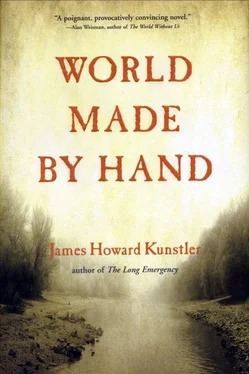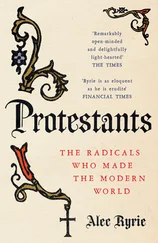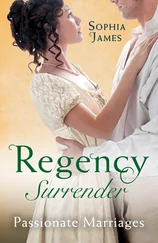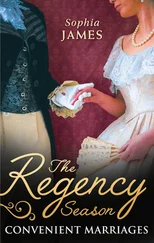“Robert will build the coffin,” Loren said finally.
“I want an open coffin at the funeral,” Britney growled back between her sobs.
“You don’t have to decide that now.”
“I want everybody to see what they did to my husband.”
“We’ll keep him here until tomorrow morning,” Loren said, apparently eager not to quarrel. “Ten o’clock we’ll start at the church.”
“I’ll fetch his good clothes before that,” she said.
By evening, a stream of callers had come by the Watling house, and many lingered to lend a sense of solidarity. Loren had informed a few key individuals, and the news of Shawn’s death spread quickly through town and out into the countryside. Jeanette Copeland and Jane Ann Holder volunteered to stay the night with Britney and her daughter. Neighbors brought dishes over to give both sustenance to the callers and some focus to the gathering. Ellen Weibel brought a ham and Jane Ann several bottles of her wine, and Eric Laudermilk brought jugs of new ale, and my neighbor Lucy Myles brought her sausage, and several women brought “pudding,” a savory staple of our tables made from leftover bread scraps, which we no longer throw away, mixed with anything else you have around, say bacon, squash, kale, chestnuts-like Thanksgiving stuffing. There was samp, which used to be called “polenta” in the upscale restaurants of yesteryear, cornmeal grits doctored up with cheese, mushrooms, or what have you. Maggie Furnival brought a buckwheat pilaf, Nancy Deaver a barley pilaf. There was, of course, corn bread, our staple. Donna Russo brought two coffee cakes made, she said, with the last of their wheat flour. And insofar as it was June, we had plenty of fresh greens, spinach cooked with bacon and green onions, radishes, rocket and lettuce salad, peas with mint. Elsie DeLong brought new beets. Katie Zucker brought honey cakes made of ground butternut meal. Annie Larmon brought fresh cream from their farm and whipped it up for the cakes. Felix Holyrood, who ran the leading cider mill in Washington County, brought a keg of his powerful “scrumpy,” which was stronger than beer. For all that, the evening was hardly festive, but a very somber, measured gathering, with fussing over the dishes a way to signify that life would continue, as well as to give people something to do with their hands.
It was a warm, sticky evening. Mosquitoes rose out of the long shadows in ravening clouds, and people who sought fresh air outdoors were eventually driven back inside to escape them, while big furry moths banged away at the screens. The neighbors had considerately brought extra candles, and the first floor seemed almost as bright as if the power were still on, but the candles also added to the heat inside.
What had originally been the keeping room when the house was a tavern after the Revolutionary War-and then became first a law office, then a nursery, then a parlor, then Shawn’s grandfather’s optometry shop in the 1950s, and finally a television room in the late twentieth century-had been converted into a broom-making shop by Britney. Here in the large south-facing room with good light she made brooms out of rush and willow and birch, and baskets out of split ash, and wooden spoons out of whatever hardwood scraps were left over. The household had been reorganized in a way that Shawn’s parents would have never understood. What had been the Watlings’ real estate office from the 1970s until 2003 was now a suite of pantries, food storage, and canning rooms off a kitchen centered on an enormous wood-fired cookstove for processing the output of the garden. No one years ago would have anticipated how much production moved back into the home when the machine age ended. The family’s personal quarters were upstairs, including a sitting room. It was a large old house and they kept it in good condition.
Surprisingly little curiosity was expressed about the incident that had left Shawn dead, once I had related what I knew two or three times and it got around to all present. It was eerie, a portentous signifier of our true social condition beyond the conventions of a funeral. Nobody wanted to disturb Wayne Karp and his bunch any more than they would poke a nest of rattlesnakes with a stick. We all knew the apparatus of justice had dissolved. Heath Rucker, our good-for-nothing constable, didn’t come around that evening. For all anyone knew he was drunk or off fishing. Our mayor, Dale Murray, turned up among the later arrivals. He sought me out and cornered me and made a little show of saying, “We’re going to get to the bottom of this.”
“How,” I said. “By what kind of procedure.”
“We’ll convene a grand jury,” he said, “and you’ll testify.”
“I didn’t see a damn thing. And anyway have you noticed the county courts are suspended?”
“I don’t think Mr. Bullock will remain unmoved in the face of a cold-blooded murder.”
“We’ll see about that,” I said. Dale Murray had once prosecuted a lawsuit against my father-in-law and ended up getting stung in a countersuit. Though he had turned up late at this impromptu wake, he was not altogether steady on his feet. “By the way,” I said, “I’d like to get to the bottom of how you happened to sell the high school to this Christian bunch that just landed.”
“They made an offer. I accepted.”
“On whose authority?”
“You look here. Nobody else in this burg takes an interest in civic affairs, yourself included. The building’s been empty for years and the roof is falling in. These people, whoever the hell they are, they’re going to keep the place from falling apart completely.”
Before I could ask him where the money was, Laura Holyrood, wife of Felix, who apparently had also been drinking some, came between us with a plate all loaded with a supper for Dale, and in her amorously restless way started flirting Dale up, making sure he noticed her substantial bosom. So that was as far as we got on the school matter. I excused myself and went and found Loren and some of our music circle. We had to discuss what hymns and pieces we might play at the funeral.
Through the windows, the sun sank below a distant hilltop. There was a commotion across the room. Brother Jobe appeared in the open door with a delegation of his followers.
There were five of them besides Brother Jobe, all men, wearing the somber black suits of their sect and carrying hats in their hands. They were all clean-shaven, not like most of us Union Grove men. It struck me as an odd reversal of the way things used to be long ago: the secular clean-shaven and the pious bearded. Only Brother Jobe wore a necktie, a black ribbon cravat, as though it were an emblem of rank. He was sweating impressively. The others were all younger, in their twenties and thirties, uniformly large and powerful men, a different breed almost, like draft horses are to quarter horse stock. You could see how Brother Jobe would feel confident in their company, and you wondered whether he had selected them for their heft and strength.
The whole clutch of them paused at the door while the low buzz of conversation throughout the room dropped away. I think Brother Jobe was aware that he had given himself a theatrical entrance, and he was prepared for it with a little speech.
“Evening to you all,” he said, and introduced himself and the others by their given names, Brother Joseph, Brother Elam, Brother Eli, and so on. “I suppose you know by now that we are setting up over at your old high school. We are called the New Faith Brotherhood Church of Jesus and we have come out of Virginia by way of Pennsylvania because of what has happened in our nation’s capital. We are happy and grateful to have found this situation and look forward to uniting, so to say, with your community. We come here tonight in recognition of the sadness that has touched upon you today, to pay our respects and begin introducing ourselves, because we do not want you to fear us or think us to be alien beings. We are upright Americans, like yourselves, banded together in faith, praise Jesus, to meet the unfortunate circumstances of these our times. We expect to find new friends here and work fruitfully alongside you, and I hope you will feel the same amongst us. Well, that’s all I got to say. Except,” he added with a fresh attack, “I wish to reassure you of our friendly intentions by saying we have brought a barrel of good Pennsylvania whiskey on the cart outside and we invite you to partake of it. Now that is all I got to say.”
Читать дальше












